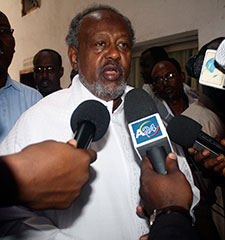Online journalist Houssein Ahmed Farah spent more than three months in jail in Djibouti before an appeals court finally released him in November–after his defense requested bail three times, Houssein said. His crime? Officially nothing. “It appears to have been an arbitrary arrest because there is still no evidence on file,” Houssein told me. He said he was accused of distributing identity cards for the opposition, but he has not been charged with a crime.
The reporter for exile-run critical news website La Voix de Djibouti slept on a mattress provided by his family in a 24-square-meter cell with 75 inmates and two toilets that functioned intermittently. The capacity of the central Gabode prison in the capital, Djibouti City, is 500, but 735 are currently inside, Houssein said. A diabetic, he had to rely on visits from doctors once every 15 days and a long bureaucratic circuit to receive medication. “In fact, everything must go through the prison warden, an ex-policeman loyal to the regime, so I was not medically monitored or allowed physical exercise to lower my blood sugar,” he said.
Houssein and his colleagues at La Voix de Djibouti are accustomed to harassment by authorities. “Since my release I go every Thursday to register with the court,” he said, “Judge Lamisse Mohamed told me I am still facing two proceedings, one of which dates back to February 2011, when they accused me of participating in an insurrectional movement.”
In February 2011, Houssein was arrested along with five colleagues and spent four months in preventive detention at Gabode for participating in a protest rally, local journalists told me. That rare series of protests was organized by civil society and opposition parties in response to an amendment to the constitution that allowed President Ismael Omar Guelleh to run for a third term, according to news reports. (Guelleh was re-elected in April 2011). In February this year, police beat La Voix de Djibouti reporter Abadid Hildid in the capital and detained him for about 24 hours, warning him to stop his reporting, local journalists said.
It is no wonder Le Voix de Djibouti is routinely blocked within the country and its staff face problems; Djibouti has been run like a family fiefdom since independence in 1977, with zero tolerance towards dissent. The website is run by Houssein’s brother, Daher Ahmed Farah, the leader of one of the main opposition parties, the Movement for Democratic Renewal (MRD). In 2008, Guelleh banned the party, accusing it of supporting neighboring Eritrea in a plot to invade the country, according to the United Nations. The party is appealing the ban at the Supreme Court, local journalists said, and the European Parliament in a 2009 resolution urged the government to let the party resume its activities.
As in many autocracies, rare independent media such as La Voix de Djibouti tend to be highly critical of the regime, acting as a slight counter-balance to the state’s media. The national broadcaster, Radio Television of Djibouti, holds a near monopoly of the airwaves and operates as the ruling party’s mouthpiece, unquestioningly reporting on the president’s visits and appointments. Only 7 percent of Djiboutians use the Internet, according to the International Telecommunication Union, and the single state-controlled Internet service provider ensures state censorship of the Web, local journalists told me. Despite constitutional guarantees protecting free expression, criminal laws on publication of “false news” and defamation are used to stifle criticism. There are hardly any independent civil society organisations, local journalists told me, and with nearly all employment controlled by the state, criticism of the ruling party could jeopardise any potential employment opportunities.
And yet, you will hardly hear a whimper of protest from the international community. The United States consulate did visit Houssein in prison, local journalists told me, but did not make the visit public. Although Djibouti is tiny, the coastal country is hugely significant for the Western world and elsewhere. Djibouti’s Camp Lemonnier, the operating base of U.S. Africa Command, holds 2,000 U.S. troops in addition to occasional naval forces, according to news reports. The country’s harbor has become a central base for American, European, and NATO anti-piracy activities–its strategic location in the Red Sea and Gulf of Aden helps protect some of the world’s busiest shipping lanes.
Houssein has a long history of writing critical stories for La Voix de Djibouti, such as on the ongoing detention of political prisoners, chronic water shortages, and corruption in the government’s management of traffic lights. Despite the repeated arrests, Houssein vows to continue. “My arrest recalls that freedom of the press is trampled in Djibouti,” he said. “I will continue to write, although it is not without risks, because power always uses repression to silence dissent.”
